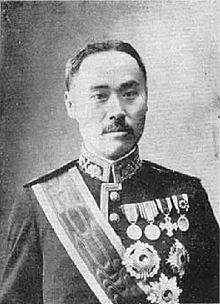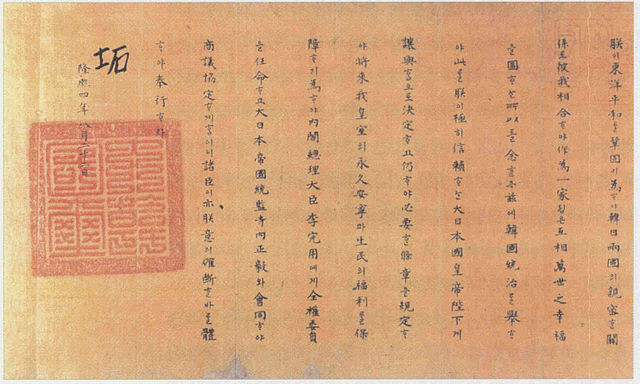Loading AI tools
Korean politician (1858–1926) From Wikipedia, the free encyclopedia
Lee Wan-yong (Korean: 이완용; pronounced [iː wɐȵoŋ]; 17 July 1858 – 12 February 1926), also spelled Yi Wan-yong or Ye Wan-yong,[1] was a Korean politician who served as the 7th Prime Minister of Korea. He is best remembered for signing the Eulsa Treaty and the Japan–Korea Annexation Treaty, which placed Korea under Japanese rule in 1910. Lee's name has since become a byword for the chinilpa, or Korean figures who have collaborated with the Japanese Empire.
You can help expand this article with text translated from the corresponding article in Korean. (May 2019) Click [show] for important translation instructions.
|
Lee Wan-yong | |
|---|---|
 | |
| 7th Prime Minister of Korea | |
| In office 11 August 1910 – 29 August 1910 | |
| Monarch | Sunjong |
| Preceded by | Pak Che-soon |
| Succeeded by | Office abolished |
| Personal details | |
| Born | 17 July 1858 Gwangju, Gyeonggi, Joseon |
| Died | 12 February 1926 (aged 67) Keijō, Korea, Empire of Japan |
| Korean name | |
| Hunminjeongeum | 이완용 |
| Hanja | 李完用 |
| Revised Romanization | I Wanyong |
| McCune–Reischauer | I Wanyong |
| Art name | |
| Hunminjeongeum | 일당 |
| Hanja | 一堂 |
| Revised Romanization | Ildang |
| McCune–Reischauer | Iltang |
| Courtesy name | |
| Hunminjeongeum | 경덕 |
| Hanja | 敬德 |
| Revised Romanization | Gyeongdeok |
| McCune–Reischauer | Kyŏngdŏk |
Lee Wan-yong was born into the Ubong Yi clan (우봉 이씨; 牛峰李氏) to a poor aristocrat family in 1858, but grew up with a lot of support after he became the adoptive son of Yi Ho-jun, who was a friend of Heungseon Daewongun and an in-law. He learned English and theology at Yookyoung Park, went to the United States to live as a diplomat, and returned to Korea to serve as a pro-Russian politician until the 1896 Agwan Pacheon incident, where King Gojong and his crown prince took refuge at the Russian legation in Seoul. As Japan grew stronger, he became a pro-Japanese politician.[2]
Lee was a founding member of the Independence Club established in 1896 and belonged to the "reform faction" which wanted to Westernize Korea and to open the country to foreign trade.[3][4]
Lee was a prominent government minister at the time of Eulsa Treaty of 1905, and was the most outspoken supporter of the pact which made the Korean Empire a protectorate of the Empire of Japan, thus stripping it of its diplomatic sovereignty. Initially, all of the ministers were against signing the treaty. However, under threat of execution, five of the ministers signed the treaty. Lee was among the first to change his stance.[5]
The treaty was signed in defiance of Korean Emperor Gojong, and Lee is thus accounted to be the chief of five ministers (including Pak Che-soon, Lee Ji-yong, Lee Geun-taek, Gwon Jung-hyeon) who were later denounced as the "Five Eulsa Thieves" in Korea.
Under Japanese Resident-General Itō Hirobumi, Lee was promoted to the post of prime minister from 1906 to 1910. Lee was instrumental in forcing Emperor Gojong to abdicate in 1907, after Emperor Gojong tried to publicly denounce the Eulsa Treaty at the second international Hague Peace Convention. In 1907 Lee was also chief amongst the seven ministers who supported the Japan–Korea Treaty of 1907, which further placed the domestic affairs of Korea under Japan's control, thus completing the colonisation of Korea by Japan. Lee is therefore also listed in Korea amongst the Seven Jeongmi Traitors. In 1909, he was seriously injured in an assassination attempt by the "Five Eulsa Traitors Assassination Group".

In 1910, Lee signed the Japan-Korea Annexation Treaty by which Japan took full control over Korea, while Korean Emperor Sunjong refused to sign. For his cooperation with the Japanese, Lee is also listed in Korea amongst the eight Gyeongsul Traitors. He was rewarded with a peerage in the Japanese kazoku system, becoming a hakushaku (Count), in 1910, and was raised to the title of kōshaku (Marquis) in 1921. He died in 1926.
Lee's name has become a byword for "traitor" in contemporary South Korea.[1] Despite this, Seo Jae-pil's Dongnip Sinmun (Independence Newspaper) never published any criticism against him.[6]
The South Korean Special law to redeem pro-Japanese collaborators' property was enacted in 2005 and the committee confiscated the property[7] of the descendants of nine people that had collaborated with Japan when Korea was annexed by Japan in August 1910. Lee is one of those heading the list.[8]
Seamless Wikipedia browsing. On steroids.
Every time you click a link to Wikipedia, Wiktionary or Wikiquote in your browser's search results, it will show the modern Wikiwand interface.
Wikiwand extension is a five stars, simple, with minimum permission required to keep your browsing private, safe and transparent.